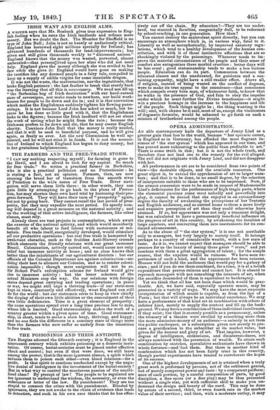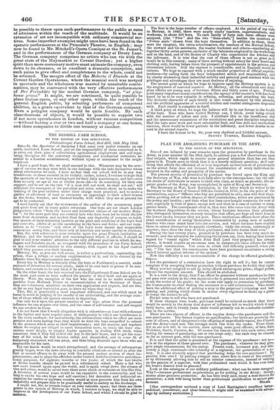OPERA ADMINISTRATION.
AN able contemporary hails the departure of Jenny Lind as a greater gain than loss to the world, because "her operatic career, in England as in Germany, has afforded the most flagrant in- stance of the star system' which has appeared in our time, and has proved more exhausting to the public than profitable to art." There is some truth in this ; but it is not the whole truth, and therefore does not lead one to the remedy for the evil alleged. The evil did not originate with Jenny Lind, and did not disappear with her.
All performances in art are to be considered from two points of view—the desirable objects, and the available resources. One great object is, to extend the apprehension of art to larger num- bers; and that is to be done, in no small degree, by the selection of interpreters suitable to those who are to be impressed. Now, if the utmost concession were to be made in respect of Mademoiselle Lind's deficiencies for the performance of high tragic parts, where the elemental passions come most nakedly and powerfully into play, it cannot be denied that she enjoyed in an extraordinary degree the faculty of awakening the perceptions of her Teutonic and English audiences, and so carried home to them a more lively and exquisite perception of art than they could otherwise have attained. If so, her appearance was not only a transient delight, but was calculated to have a permanently beneficial influence on the progress of art in this country, by awakening the faculties of large numbers, and converting them into instruments for its con- tinued advancement.
As to the abuse of " the star system," it is one not ascribable
only to managers, but very largely to society itself. It belongs perhaps to a country of considerable wealth, with a low state of taste. As it is, we cannot expect that managers should be able to procure for us the luxury of seeing these great " stars," and yet combine with them a great aggregation of talent ; for the simple reason, that the expense would be ruinous. We have seen ex- periments of such a kind, and the experiment has been ruinous. Houses will not hold the audiences that would pay for a galaxy of stars ; and if you do see them combined, for a time, it is at a lavish expenditure that proves ruinous and cannot last. It is absurd to reproach managers with not consulting the interests of art, when the sacrifice demanded of them is equivalent to bankruptcy.
Yet we think that all has not been dope which would be prac- ticable. Art, we have said, especially operatic music, may be presented in a variety of ways. We may have the most exquisite interpretation of which music is capable, as from the lips of a Pasta ; but that will always be an individual excellence. We may have a performance of that kind set in combination with others of inferior kind, merely to supply the context and fill up the back- ground. We may have a combination of these individual excellences, if they exist; but that is scarcely possible as a permanency, unless the treasury of a theatre were swelled by something more than the mere admission-money of an audience—a subsidy to art from the public exchequer, or a subscription given not merely to pro-. cure a gratification to the subscriber at its market value, but given for the honour and glory of art. That implies, however, a degree of intelligence, enthusiasm, and disinterestedness, not always combined with the possession of wealth. To attain such combination by snatches, speculative enthusiasts have thrown in whole fortunes—andlost them. But there is another kind of combination which has not been fairly tried in this country, though partial experiments have tended to corroborate the hopes of its success.
One of the highest developments of art is attained when a truly great work is performed by persons, not of the sublimest genius, but of merely competent power and taste : by a competent perform- ance of each portion, by a careful composition of parts, by good discipline, a fine opera (or a fine play) may be thus presented without a single star, yet with sufficient skill to make you un- derstand the design and beauty of the work. This may be done by artists of a second, third, or even fourth rate in the market value of their services ; and then, with a moderate outlay, it may
be possible to throw open such performances to the public at rates of admission within the reach of the multitude. It would be an extension of art not incompatible with ordinary commercial mo- tives. Some imperfect examples might once have been found in the operatic performances at the Princess's Theatre, in English ; may now be found in Mr. Mitchell's Opera Comique at the St. James's, and in the performances of the German company at Drury Lane. The German company comprises no artists who can vie with the great stars of the Haymarket or Covent Garden ; yet a higher spirit than mere mercenary motive must animate the company, even down to its choruses, or so excellent a dramatic conception, and such pains to give effect and completeness to the whole, could not be attained. The meagre effect of the .Roberto id Diavolo at the Covent Garden Operahouse, where the musical work was merged in spectacle and the wholeness was marred by unsuitable combi- nations, may be contrasted with the very effective performances of Der Freisehiitz by the modest German company, "at play- house prices." It might, we are convinced, be quite possible to place Italian opera, or any other opera, within the reach of the general English public, by selecting performers of competent abilities, in a grade equivalent to that of the German company. Even a polyglot company would be quite feasible. By such classifications of objects, it would be possible to support two if not more operahouses in London, without ruinous competition —without having a star or two and half a company at one house, and three companies to divide one treasury at another.



























 Previous page
Previous page